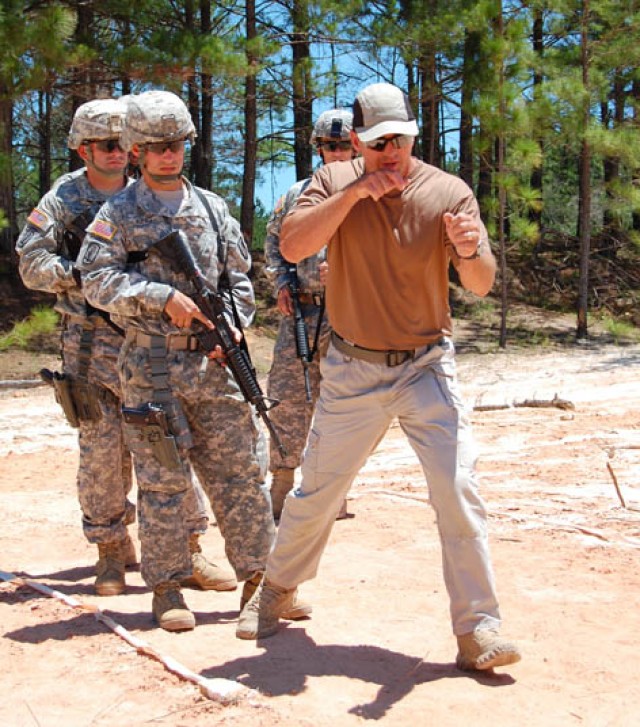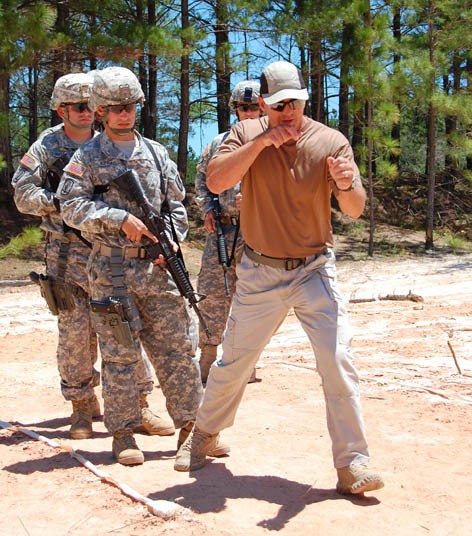FORT POLK, La. -- As Fort Polk's 162nd Infantry Brigade prepares to launch training with Foreign Security Forces-Transition Team service members on Aug. 31, Soldiers are doing everything they can to provide quality training to deploying troops. For their latest improvements, the Federal Bureau of Investigation, New Orleans Division, lent a helping hand.
Special Agent John Huber and two other agents from the New Orleans Division were at Fort Polk in late May providing weapons training and sensitive site exploitation training for small group advisors of the 162nd Inf Bde.
The training is vital for deploying service members headed to Iraq or Afghanistan who will train and advise the host nation forces. These advisors work in austere conditions, often in remote areas of Iraq and Afghanistan, with limited external resources. The only reliable resource for the Transition Teams and their host nation counterparts is the training and expertise that each team member brings.
"In this case, the FBI, the experts in (sensitive site exploitation), to include evidence collection and processing, is assisting the 162nd cadre on SSE and urban operations to increase the level of expertise and allow the unit trainers to provide a higher quality product to future combat advisors," said Maj. Mark Olin, 162nd Inf Bde operations officer.
The training, which took place over four days, was conducted in the classroom and on ranges. Soldiers learned advanced techniques with weapons and how to collect and document evidence they find during urban operations in theater. Huber, who led the training for the FBI, has 18 years of experience with two recent Operation Enduring Freedom deployments with U.S. Special Forces and 75th Ranger Regiment. He has been the FBI SWAT team leader for the past three years and the lead firearms instructor for the FBI in Louisiana.
"My deployments allow me to understand the mission and how the military operates," Huber said. "My on-the-ground experiences in Afghanistan allow me to teach what I did there to these Soldiers."
Bringing together two entities like the FBI and the Army may seem like a difficult task, but it is not. U.S. Special Forces and the FBI maintain a persistent relationship. That relationship played a key factor in making this training available to the 162nd.
"The 162nd wanted to establish and maintain a similar relationship with the FBI in New Orleans," Olin said. "After several weeks of requests and approval, the FBI and the 162nd formalized the relationship. And, because of this relationship, several members of the FBI in New Orleans received specialized training in Quantico in preparation for the two training events."
However, this is the first time the FBI New Orleans Division has worked with military personnel.
"It has been and will be a mutually beneficial relationship with resource sharing, especially organization specific (tactics, techniques and procedures) that will prove valuable in both combat theaters where interagency cooperation is increasing daily," Olin said.
The sum of knowledge from both organizations helps provide better-trained service members when they head down range to be combat advisors.
"We used to collaborate only rarely, but the counter-insurgency fight in Iraq and Afghanistan has shown us that many government agencies outside the Army can provide incredible value to our training through their own expertise in distinct fields of endeavor," Olin said. "By bringing this outside expertise to bear, we make our own training better and increase our capabilities. In the end, events like this lead to greater mission accomplishment and saved lives in Iraq and Afghanistan."
This was not a one-time event between the FBI and the Soldiers of the 162nd. The plan is to have the FBI experts visit quarterly or bi-annually to provide the newest techniques and lessons learned to improve training here.
"These initial visits will continue to focus on advanced marksmanship techniques and site exploitation with regard to urban operations, and we will continue to examine ways that we can leverage the interagency expertise to broaden our training events," Olin said.
Huber said he looks forward to visiting Fort Polk to conduct training as well. He said it will depend on his schedule and availability, but he enjoys working with the military and can't wait to come back.
"As an American, I feel I have a strong responsibility to do anything I can to help the military," Huber said. "I have fun doing it. I like doing it, and I will do what I can to provide what I can."


Social Sharing